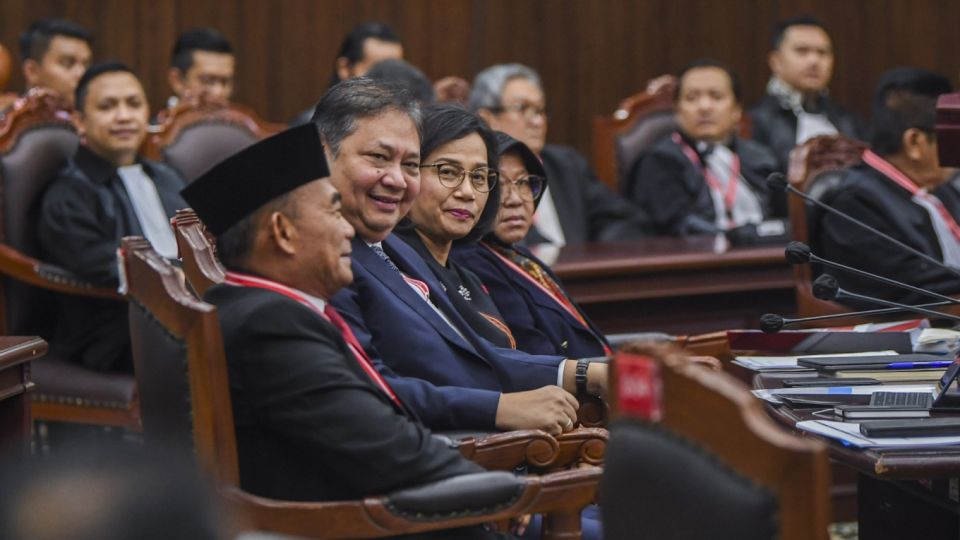April 8, 2024
JAKARTA – In the last hearing of the 2024 election dispute, the Constitutional Court grilled four members of President Joko “Jokowi” Widodo’s cabinet over presidential working visits and social assistance disbursement during the campaign season, which feature among key allegations made by the unsuccessful presidential camps.
Anies Baswedan and Ganjar Pranowo have challenged the electoral victory of Prabowo Subianto, calling for a revote without the president-elect and his running mate, Gibran Rakabuming Raka , who is the eldest son of President Jokowi.
In their petition, they claim that the Prabowo-Gibran victory was helped by large-scale electoral fraud and Jokowi’s partisanship, they allege the President politicized social aid during the campaign to sway voters in favor of the incumbent defense minister’s ticket.
The court called four ministers, namely Coordinating Economic Minister Airlangga Hartarto, Coordinating Human Development and Culture Minister Muhadjir Effendy, Finance Minister Sri Mulyani Indrawati and Social Affairs Minister Tri “Risma” Rismaharini, to testify during a hearing on Friday.
Airlangga, who also chairs the Golkar Party, which backed the Prabowo-Gibran presidential bid, asserted that the government did not deliberately distribute additional social assistance during the election year and the mechanism for social aid distribution remained the same compared with previous years.
He added that the decline in rice production triggered by El Niño made it more important for the government to disburse social aid, in an effort to help the poor cope with rising food prices amid a drought and global supply chain disruptions.
“The government has to implement strategies to maintain the availability of food supplies and people’s purchasing power,” the senior minister said, asserting that the program was implemented transparently.
Muhadjir denied allegations that the government’s rice aid provided between January and June this year helped Prabowo in the presidential election.
In his testimony, he also defended Jokowi from claims that the President was covertly campaigning for Prabowo under the guise of working visits, saying such trips were routine to prevent strategic projects from stalling.
“It’s impossible [to conclude] that visits to, for example, 100 regions, where he symbolically distributed social assistance would have an effect nationally,” Muhadjir said, before the bench stopped the senior minister from conveying his personal opinions further.
From presidential funds
Sri Mulyani, who was previously rumored to be on the point of stepping down over conflicts resulting from Jokowi’s alleged behind-the-scenes political maneuvering, said the social aid was part of the government budget, which had been approved by the House of Representatives and enacted before the General Elections Commission (KPU) finalized the presidential candidates.
“The aid realization and payment pattern were no different from the past six years,” the finance minister said during the hearing. “We ensured that the drafting and enactment of the 2024 state budget were not influenced by who would join the presidential race.”
When asked about the source of funding for the social aid disbursed by Jokowi during his working visits, Sri Mulyani denied that it came from the government’s social assistance budget. The President used his own operational budget, which also came from the state coffers.
Social Minister Risma said the government could not delay distributing the social aid simply because of the election, as it was crucial to help the poor to sustain themselves.
Risma is a member of the Indonesian Democratic Party of Struggle (PDI-P), which has had a poor relationship with Jokowi ever since he supported his son on a rival ticket. The PDI-P backed its own member Ganjar for the presidential race.
When justices asked why she was rarely seen distributing the social aid with the President, Risma said she only participated on occasions when there were discrepancies in the distribution.
During the hearing, Justice Arief Hidayat asked the four ministers whether the President had briefed them before testifying at the court. Airlangga answered that they attended the Friday hearing under the President’s direction to testify in accordance with their duties.
Decision imminent
Speaking after the hearing, Prabowo’s legal team expressed its optimism that the ministers’ testimonies served as enough proof that the government did not misuse social aid for electoral purposes.
“It’s very clear today that, as stated by [the ministers], there were no misuse of social assistance packages, as alleged by the two petitioners,” said Yusril Ihza Mahendra, a member of Prabowo’s legal team.
Prabowo’s rival camps welcomed the court’s decision to summon the four ministers, arguing that the election dispute was not merely “a matter of errors in calculating numbers” in the election result.
“It’s also about questionable use of policies and state facilities by the government for electoral purposes,” said Heru Widodo, a member of Anies’ legal team.
Todung Mulya Lubis of the Ganjar legal team expressed his hope that the justices would also summon Jokowi, arguing that the responsibility for managing social aid ultimately rested with the President himself.
But during the hearing, Justice Arief said they had summoned the ministers as it would be impossible for the court to summon the President, who is the head of state.
“I think it’s inappropriate,” Arief said. “The President as the head of state is a state symbol who needs to be respected by all stakeholders, thus, we summoned his aides.”
Friday’s hearing was the last chance for petitioners to present their witnesses and expert testimony. Justice Enny Nurbaningsih said justices would hold closed-door meetings starting April 17 to decide on the election disputes, a decision is expected to be announced by April 22.
All ministers denied the allegations that Jokowi used government aid for electoral purposes.


